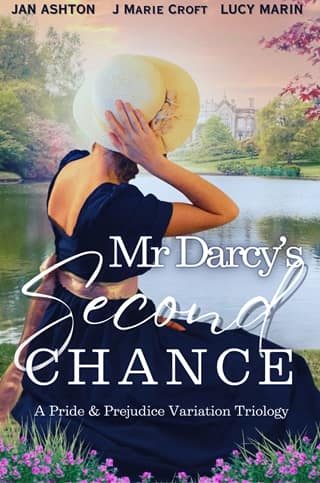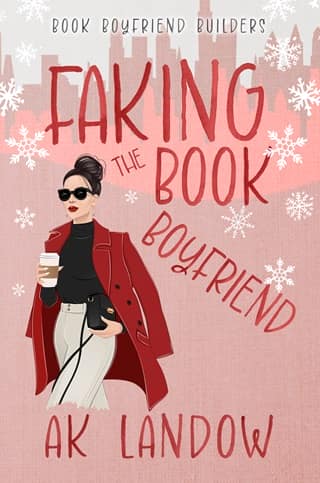Chapter 6
Six
Elizabeth clutched the letters Hill had handed her and paused at the door to her father's book-room, uncertain he would welcome her and the questions she had conjured up overnight. Mr Bennet had found folly in the news that Mr Darcy had come to Meryton. Did he not wonder why the nemesis of Jane's future husband—his own future son-in-law—had come? Would he seek out Mr Darcy to learn more about his erstwhile friend and find out the truth of their history ? Would he write to Mr Wickham and reveal the man's presence here? Should he?
She knew little of the business being conducted between them. A letter for Jane would arrive from Mr Wickham, often with a short note inside requesting she remind her father to reply to a letter sent a few days prior. If Mr Bennet were writing to Mr Wickham, Elizabeth had no knowledge of it. He was frustratingly silent about it all. Hill would likely know, but Elizabeth was wary enough of the situation that she would not ask her.
Mr Darcy's presence at Netherfield offered an opportunity to learn more about Mr Wickham—the man on whom Jane's future welfare depended. Mama may see Mr Darcy as a cruel pariah, but he is the only acquaintance of Mr Wickham's we are likely to meet before he returns and the engagement is made official.
Elizabeth lifted her hand to knock. "Papa, I have today's post for you."
To her surprise, he opened the door, frowning when he saw what she held. "Put them on my desk, Lizzy. I wish to breakfast in peace, without your youngest sisters' quarrelling or negotiating Jane's marriage."
"What?" She touched his arm as he moved past her. "What do you mean, negotiating? Have the details not been settled?"
Sighing, he patted her hand. "Nothing to concern you. But do promise me at least a half-year's acquaintance with any gentleman before you consider him as a husband."
Mr Bennet disappeared down the hall towards the breakfast room. Elizabeth watched him for a moment, thinking how creased his brow had become, and stepped closer to the desk. It was uncommonly neat, not at all covered with its usual clutter of books and notes and unanswered letters. Each of her parents had a habit of tidying up when most agitated; it was one Jane and Kitty also shared. Clearly her father was out of sorts, and Mr Wickham was the likeliest culprit.
Bingley took one look at Darcy's tired countenance and suggested they ride out after breakfast. Although he partook of little besides coffee and toast, Darcy was eager to be out of doors and clear his head. They rode without conversation, cantering across the fields and jumping over stiles. Hertfordshire was a flat land, with few hills of any difficulty for a good horse. Only one rise of any note was to be found; Oakham Mount, Bingley told him, was a steep climb he had not yet attempted by horse.
"Miss Elizabeth recommends the views. She walks up there a few times a week."
Darcy turned from his observation of the hill—an impressive rise for such an area but meagre compared to what was found in the Peaks. "To the top? That is an arduous climb for a lady."
"She says she prefers walking to riding, though it may be her only choice, as Longbourn has but two horses."
That the lady with the flashing eyes and slim but pleasing figure undertook long and demanding rambles had Darcy in wonder, but that Longbourn had only two horses? What kind of estate had so few? An impoverished one. Unless Mr Bennet was miserly or his wife spent all his wealth on their five unmarried daughters' wardrobes. "Bingley?—"
"It is a fine estate, Darcy, albeit one with a thin stable. I believe there is a mule as well."
Darcy had not meant to exhibit disapproval, but he was not ashamed of it—Wickham's connexion to Longbourn commanded his interest. Heedless of the reasons for Darcy's curiosity, Bingley continued defending the Bennets.
"Not every landowner can boast of your stables and fields and woods. Mr Bennet is a fine gentleman, but not one inclined to ride out to see tenants or inspect his lands as you like to do."
Darcy's doubts about Longbourn grew, as did his curiosity about what Wickham knew of it. "Has Mr Bennet a steward?"
Bingley shrugged. His lack of estate experience showed in his reply. "Must he?"
Darcy's scowl prompted Bingley to sit straighter in his saddle. "I have not heard mention of one, but I am certain he does."
They arrived back at Netherfield to find a carriage in the drive. Bingley's face lit up in delight, and he took the steps two at time. Darcy followed, pausing only when he heard a loud screech emerging from the direction of the drawing room.
"Good lord, have you ordered an aviary? What is that noise?"
"That, my friend, is laughter—a sound you make all too rarely." Bingley chuckled. "My sisters have surprised me by finally seeing fit to return the Bennets' hospitality. I believe that was Miss Lydia."
Darcy slowed, reluctant to engage in any niceties with the Bennets, at least not until he had changed from his ride. Too late, Bingley had pulled him through the door and into the room, where one was welcomed with cheerful smiles and the other with solemn civility.
The young women he had met in Meryton the day prior were arranged on chairs and sofas; Miss Bingley and Mrs Hurst sat primly on a delicate settee near Miss Bennet. Her expression was serene, which he found unreadable, but it certainly displayed her flawless beauty. Few men would not be drawn to such a lady, even if only to claim the right to stare at her and parade her as theirs. Wickham did enjoy being envied—was the attraction and the attachment so shallow for him?
The lone stranger to him was, he immediately knew, the mother of the five Bennet sisters. She was a handsome woman of some forty years, with large dark eyes similar to those of Miss Elizabeth and the younger one who had been cackling like a pecked hen. Mrs Bennet's eyes narrowed when they were introduced, and his gaze moved quickly to Miss Elizabeth. She had been staring at Miss Bingley but turned to look at him when he and Bingley entered. She appeared to be suppressing some emotion. Anger? Amusement? Her lips quirked, an eyebrow rose, and he wondered what they had interrupted; if Miss Elizabeth were as intelligent as Bingley claimed—and as she appeared to him—she and Miss Bingley would rub together poorly. What did she think of Wickham? Perhaps she would not be fooled by him.
"Mr Darcy, you have met my eldest, Jane, who will be known as Mrs George Wickham after she marries your friend."
He turned again to Mrs Bennet, who was gazing at him with as much smugness in her expression as any lady of the ton . "Ah, yes." It was an inadequate reply but all Darcy could manage on hearing that man's name spoken aloud. At least Miss Bennet appeared unconcerned by his brusqueness; she offered him a warm smile, making him wonder whether Wickham had refrained from defaming the Darcy name to her.
That hope was dashed when Mrs Bennet addressed him once more, in an arch manner that presumed superiority. "Mr Wickham has shared some stories of growing up at your family estate. We would be eager to hear more childhood tales."
Darcy stared at her, as surprised by her direct address as he was by her insouciant tone. Much as he wished to stalk about the room, provide them a full telling of Wickham's shameful life, and demand to know Miss Bennet's heart, he merely nodded politely. "The usual gambols and games of boys in the country."
Clearly bewildered by the exchange, Miss Bingley began stating her usual praise for Pemberley. "The finest house and gardens in all of England?—"
"Poor Mr Wickham, losing your friendship and his childhood home," Mrs Bennet said in a lofty voice. Before he could reply, or even sit down, as he did not wish to do—he was windblown and uncomfortable and wished to leave the room, leave Netherfield, leave these people—another voice spoke out.
"Now, Mama, no man remains exactly the same as he was as a boy." Miss Bennet was looking earnestly in their direction. "Just as a girl might enjoy climbing trees and catching frogs with the boys in her neighbourhood, she is unlikely to continue those pursuits when she is a young lady, is she, Lizzy?"
The two sisters exchanged a glance that exposed some deep understanding of each other. Although still seeking to extricate himself from the company before he insulted one or more Bennets—or worse, demanded Miss Bennet account for her ridiculous gullibility—Darcy could not help but admire the intimacy of their sisterly connexion. Surely Miss Elizabeth knows her sister's heart and has some understanding of Wickham .
"Indeed, a child is innocent and his character forms early, but it is life's events and circumstance and those around him that determine the shaping of it." Miss Elizabeth smiled mischievously. "I once took three apples from Mr Lamb's basket and fell ill with a bellyache after eating them. I could not confess what I had done and thus suffered through a number of Mrs Hill's potions. From this I learnt to be honest, to never steal, and to certainly never eat apples meant for livestock." Shrugging, she added, "Some, however, would only have learnt the last of these."
As the others laughed, Darcy bit back a smile. He felt more certain that Miss Elizabeth questioned Wickham's character, and he tried to form a response worthy of her witty reply. Before he could speak, Miss Lydia—who shared Miss Elizabeth's lively expression but not her manners—claimed his attention.
"Mr Darcy, we have heard much of you from Mr Wickham."
"Indeed." Darcy scarcely heard her words, as he was preoccupied wondering how much of the cream cake the slovenly girl was balancing on her plate would end up on her skirts.
"He may not have his inheritance, but soon he will be rich and it will not matter," Miss Lydia continued.
Rich from whatever schemes he is perpetrating. He kept his eyes on the cake, silently wagering on its remaining time on the porcelain plate. "I am happy for any honest man's good fortune."
"Brother, will you and Mr Darcy join us for tea?" Miss Bingley's desperation for relief from the Bennets was clear, but neither man had a chance to refuse, as Mrs Bennet had more opinions to share.
"We are quite fond of Mr Wickham and anticipate his return to us soon. In spite of his many hardships, none of his own making, he has been so good to us and to dear Jane." Mrs Bennet nodded at her blushing daughter and, returning her attention to Darcy, continued in a cool voice. "Are you to stay long at Netherfield, Mr Darcy?"
His lips twitched as he watched a dollop of cream fall onto the carpet. As his eyes rose, they met the fiery gaze of Miss Elizabeth. Had she seen him amusing himself at her sister's expense, or was she angry at the girl's clumsiness? Either would do; he was finding the ever-varying intensity of emotion on her countenance to be fascinating. More than fascinating—it held an allure he could not explain.
"I am uncertain as to the duration of my visit." It was a reply sure to alarm Miss Bingley, who counted on Darcy to remain a month in full. "Of course, my friends may wish me to leave immediately if I traipse further on their hospitality and rugs so soon after a ride. Truly, I, and the scent of my horse, shall trouble you no longer. A pleasure."
He bowed and began edging towards the door. The coward's way out, yes, but truly, he did smell of the saddle.
"Darcy is correct. I suppose we are intruding, but we did so wish to greet our friends."
Bingley made to follow him. Now there was a good fellow!
"Nonsense, do stay!" cried Miss Bingley. "My brother and Mr Darcy enjoy their sport. He is a dear friend to our family, and we wish for him to remain with us at Netherfield for as long as he wishes," she stated, her chin rising as she spoke. "We wish for his sister to join us here as well, do we not, Louisa?"
Mrs Hurst nodded vigorously.
"I thank you, but as I stated before, my sister is occupied with my aunt and uncle."
Despising that Georgiana had been mentioned, Darcy dipped his head and disappeared into the hall. He was halfway up the stairs, desperate for a bath, when he heard Bingley's hasty footsteps behind him.
"I apologise, old man. Apparently, Miss Bennet's betrothed has shared his dislike of you with the Bennet family—well, truly with all of Meryton."
"That was made plain," Darcy replied sourly, "particularly when Wickham's kindness and friendliness were emphasised."
Bingley exhaled heavily as they reached the last stair and turned towards the family wing. "Come now, Darcy. The people here are friendly and inquisitive. Make some effort to show them you are not the tyrant Wickham has portrayed."
"‘Tyrant'? I thank you for clarifying how I am seen."
"No!" cried Bingley. "I apologise. You are a wonderful friend, and like many, I rely on your advice and ability to manage things. Some may misunderstand?—"
"Wickham enjoys charming the ignorant and unknowing with his falsehoods," Darcy muttered. "I am long used to his slanders."
"It seems to me that any man worthy of a lady such as Miss Bennet should be a gentleman and keep his unpleasant opinions about another man to himself."
"Well said. Would that the Bennets and their neighbours understood that kindness." Darcy reached his rooms and turned to Bingley. "I shall see you at dinner."
"Wait." Bingley's earnest expression meant more questions; Darcy hoped they were finished with the topic of Miss Bennet.
"I know little of George Wickham, but if you would confide in me what exactly he has done to earn your scorn, I would be happy to know of it. Despite your exacting standards, you are fair. You are not a man to easily disparage another."
Darcy gripped the door handle, nearly sagging in his eagerness to get inside his rooms and be alone with his thoughts. "He has betrayed my friendship and the trust of my family, and if I could, I would wish to never speak of him again."
Bingley paled. "He is to marry Miss Bennet! Is she at risk from him?"
Cursing himself for causing unease in a man already agitated about the lady, Darcy sought to reassure him. "You heard what Miss Elizabeth said downstairs. People change, albeit a grown man rarely does. Let me learn a bit more about what he has said of me, and of what he is up to—wherever he is. Much as I despise this, I am still not free of responsibility for him."
An hour later, smelling of soap rather than horse and leather, his mood an equal mix of dread and fury, he began a letter to his cousin.
 Fullepub
Fullepub 



